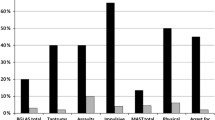Abstract
The purpose of this study was to examine the relationship between the genetic polymorphism in the promoter of the SLC6A4 gene encoding the serotonin transporter (5-HTT) and the sensitivity to noxious stimulation from a clinical perspective. The genotyping of the 217 outpatients with mild epidermal abrasion in lateral crural region was performed by a combination of polymerase chain reaction and digestion. The intensity of pain to medical alcohol treatment was rated on a visual analog scale (VAS). The results suggest that the human triallelic 5-HTT genotypes are related to individual differences in sensitivity to alcoholic sting. According to the VAS ratings, the subjects with the 5-HTT low-expression genotype reported more pain than those with 5-HTT medium- and high-expression genotypes following test stimuli. There is no significant difference between sexes in the same SLC6A4 genotype and between medium and high expressions of 5-HTT subjects. Taken together, our study supports the hypothesis that the transcription rate of the 5-HTT transporter may play an important role in the pain sensitivity and central sensitization.


Similar content being viewed by others
References
Bonica, J. J. (1979). The need of a taxonomy. Pain, 6(3), 247–248.
Matre, D., Olsen, M. B., Jacobsen, L. M., Klein, T., & Gjerstad, J. (2013). Induction of the perceptual correlate of human long-term potentiation (LTP) is associated with the 5-HTT genotype. Brain Research, 1491, 54–59.
Nielsen, C. S., Stubhaug, A., Price, D. D., Vassend, O., Czajkowski, N., & Harris, J. R. (2008). Individual differences in pain sensitivity: Genetic and environmental contributions. Pain, 136(1–2), 21–29.
Olsen, M. B., Jacobsen, L. M., Schistad, E. I., Pedersen, L. M., Rygh, L. J., Røe, C., et al. (2012). Pain intensity the first year after lumbar disc herniation is associated with the A118G polymorphism in the opioid receptor mu 1 gene: Evidence of a sex and genotype interaction. Journal of Neuroscience, 32(29), 9831–9834.
Nakamura, M., Ueno, S., Sano, A., & Tanabe, H. (2000). The human serotonin transporter gene linked polymorphism (5-HTTLPR) shows ten novel allelic variants. Molecular Psychiatry, 5, 32–38.
Lesch, K. P., Bengel, D., Heils, A., Sabol, S. Z., Greenberg, B. D., Petri, S., et al. (1996). Association of anxiety-related traits with a polymorphism in the serotonin transporter gene regulatory region. Science, 274, 1527–1531.
Hu, X. Z. (2006). Lipsky RH, Zhu G, Akhtar LA, Taubman J, Greenberg BD, Xu K, Arnold PD, Richter MA, Kennedy JL, Murphy DL, Goldman D. Serotonin transporter promoter gain-of-function genotypes are linked to obsessive compulsive disorder. American Journal of Human Genetics, 78, 815–826.
Treister, R., Pud, D., Ebstein, R. P., Laiba, E., Raz, Y., Gershon, E., et al. (2011). Association between poly- morphisms in serotonin and dopamine-related genes and endogenous pain modulation. Journal of Pain, 12, 875–883.
Lindstedt, F., Berrebi, J., Greayer, E., Lonsdorf, T. B., Schalling, M., Ingvar, M., et al. (2011). Conditioned pain modulation is associated with common polymorphisms in the serotonin transporter gene. PLoS One, 6, e18252.
Klein, T., Magerl, W., Hopf, H. C., Sandkuhler, J., & Treede, R. D. (2004). Perceptual correlates of nociceptive long-term potentiation and long-term depression in humans. Journal of Neuroscience, 24, 964–971.
Klein, T., Magerl, W., & Treede, R. D. (2006). Perceptual correlate of nociceptive long-term potentiation (LTP) in humans shares the time course of early-LTP. Journal of Neurophysiology, 96, 3551–3555.
Kosek, E., Jensen, K. B., Lonsdorf, T. B., Schalling, M., & Ingvar, M. (2009). Genetic variation in the serotonin transporter gene (5-HTTLPR, rs25531) influences the analgesic response to the short acting opioid Remifentanil in humans. Molecular Pain, 5, 37.
Mohammad-Zadeh, L. F., Moses, L., & Gwalzney-Brant, S. M. (2008). Serotonin: A review. Journal of Veterinary Pharmacology and Therapeutics, 31, 187–199.
Sanders-Bush, E., & Mayer, S. E. (2006). 5-Hydroxytryptamine (serotonin): Receptor agonists and antagonists. In L. L. Brunton, J. S. Lazo, & K. L. Parker (Eds.), Goodman and Gilman’s: The Pharmacological Basis of Therapeutics. New York: McGraw-Hill.
Kenna, G. A., Roder-Hanna, N., Leggio, L., Zywiak, W. H., Clifford, J., Edwards, S., et al. (2012). Association of the 5-HTT gene-linked promoter region (5-HTTLPR) polymorphism with psychiatric disorders: Review of psychopathology and pharmacotherapy. Pharmacogenomics and Personalized Medicine, 5, 19–35.
Hariri, A. R., Mattay, V. S., Tessitore, A., et al. (2002). Serotonin transporter genetic variation and the response of the human amygdala. Science, 297, 400–403.
Caspi, A., Sugden, K., Moffitt, T. E., et al. (2003). Influence of life stress on depression: moderation by a polymorphism in the 5-HTT gene. Science, 301, 386–389.
Matsushita, S., Yoshino, A., Murayama, M., Kimura, M., Muramatsu, T., & Higuchi, S. (2001). Association study of serotonin transporter gene regulatory region polymorphism and alcoholism. American Journal of Medical Genetics, 105, 446–450.
Hu, X., Oroszi, G., Chun, J., Smith, T. L., Goldman, D., & Schuckit, M. A. (2005). An expanded evaluation of the relationship of four alleles to the level of response to alcohol and the alcoholism risk. Alcoholism, Clinical and Experimental Research, 29, 8–16.
Lipsky, R. H., Hu, X. Z., & Goldman, D. (2009). Additional functional variation at the SLC6 A4 gene. American Journal of Medical Genetics, 150, 153.
Kuzelova, H., Ptacek, R., & Macek, M. (2010). The serotonin transporter gene (5-HTT) variant and psychiatric disorders: Review of current literature. Neuroendocrinology Letters, 31, 4–10.
Conflict of interest
The authors state that there are no conflicts of interests.
Author information
Authors and Affiliations
Corresponding authors
Rights and permissions
About this article
Cite this article
Nan, J., Yuan, H., Li, K. et al. 5-HTT SS Genotype is Associated with the Pro-nociceptive Sensation by Alcoholic Sting. Cell Biochem Biophys 68, 629–633 (2014). https://doi.org/10.1007/s12013-013-9759-5
Published:
Issue Date:
DOI: https://doi.org/10.1007/s12013-013-9759-5




